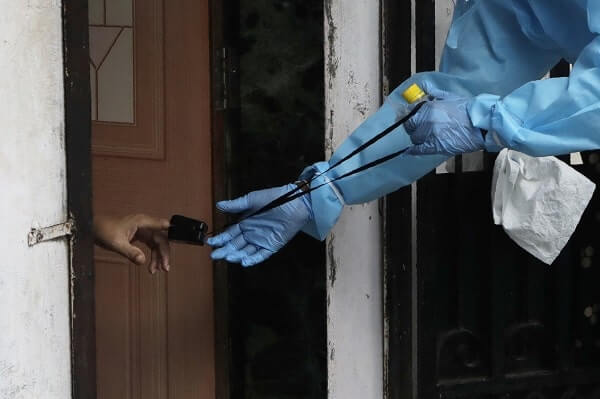Sunipa Dasgupta, 80, lives alone in her flat in South Kolkata. Her daily routine used to include regular visits from a small team of domestic staff as well as a handful of students she tutored. A daily walk around the apartment block was her only form of exercise. It was also the only time when she was able to enjoy regular social interaction with her neighbours. With COVID, Sunipa has been confronted with having to live with no help. Initially, she managed by doing some basic cooking and cleaning but as the days turned to weeks and then months, it became harder for her to manage. Feelings of loneliness and despair have followed, and this has further exacerbated her ongoing chronic health issues.
Mrs Chowdhury, a septuagenarian who lives alone, has slowly come to understand the implications of COVID-19 and the precautions that need to be taken. Initially, she was hesitant to meet anyone and lived in complete isolation, but as the months progressed, she realised that with maintaining social distancing and the use of facial masks and personal hygiene, it could be possible to start meeting a few people. However, this was discouraged by her family members and friends who cited her age and dissuaded her from doing so. She was respectful of their concern but found this to be harsh, leading to feelings of loneliness and depression.
COVID-19 has affected the lives of people from all over the world, but even more so for the elderly. In the cities of India, the situation has become exacerbated by joint families disappearing, and children moving away to lead their own lives. Consequently, what has emerged is a huge sector of the elderly who have been forced to live alone and without support from the government and their community. The absence of a social security system and policies governing the well-being of vulnerable citizens has resulted in an ever-growing chasm of need. In the past domestic workers have filled this gap (for those who can afford it), but now the COVIDrestrictions have further diminished their presence.
For many elderly people, the lockdown has magnified their isolation and subsequent levels of anxiety and distress. Social distancing, self-isolation and changes to their daily routine have had a huge impact on their lives.
READ ALSO: Grandparent-grandchildren video calls are vital during COVID-19
Most metropolitan cities in India do have elder care organisations who provide a range of vital services including medical care, assistance with errands, travel and technology services. They are predominately focussed on health care and hospital management, but what is ignored is the emotional wellbeing and engagement in life which is so critical for the elderly.
A Kolkata-based elder care service, Care Unlimited have experienced unprecedented demand during these COVID times.
Having to adapt and evolve their practices to reflect the current circumstances, they have instituted practical solutions such as arranging for food and grocery as well as medicines to be home delivered. They also began arranging for medical consultations by telephone. As house visits were not possible, daily phone calls to patients became the norm and these became the front-line solution to resolving day-to-day needs. These became a vital link providing clients with the opportunity to request help, to share their anxieties, and coax them into feeling more positive about their future. It was clear to everyone involved that if their client’s psychological wellbeing was being taken care of then their physical wellbeing was also able to be stabilised.
Over time this process extended to conference calls where two members of their team would join in to engage in a relaxed and friendly discussion. Sometimes it would involve another client who would be invited to share their experiences to help an individual appreciate that others were battling the same issues. Video calls were then introduced which took some time for many elderly clients to become accustomed to but were soon embraced with enthusiasm. Virtual communications were next and as a group, they were able to celebrate Bengali New Year, Rabindranath Tagore Jayanti, musical competitions and poetry recitations. YouTube links of artists were also shared, as were devotional messages, storytelling and information sessions and links to virtual tours of museums, art galleries and travel destinations. The idea was to establish ongoing opportunities where vulnerable citizens could still have fun and experience joy and laugher through shared group activities.
The pandemic shows little sign of abating and so it becomes ever more crucial for Care Unlimited to maintain participation levels and quality communications with their clients.
There is now a better understanding of the ferocity of the virus and its impact but uncertainty regarding the future makes planning difficult. It is therefore imperative for the elderly to remain engaged in positive endeavours whilst at the same time receiving the necessary ongoing care essential for their survival.
Elderly citizens are an indispensable part of our society. We must remain committed to ensuring their physical and psychological wellbeing even as we traverse the challenges before us. The need to address broader and inclusive community engagement and intergenerational solidarity has therefore never been greater.





